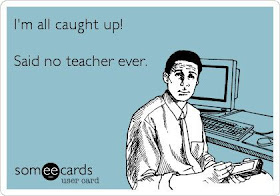Yes, this is totally a Sugarcult reference! "back, back, back to where we lasted..."
Since this is my life...
and yours, I'm sure.
I just want you to know, all of you who find time to blog ... you are my heroes!
I am playing blog catch up!
So come back, back, back with me to our Native American Unit:
Before studying each Native American Region, I try to present artifacts that I have collected over the years in different ways to help engage the kiddos in inquiry.
For the Southwest, students observed the items as groups and discussed together their uses, what they would have been made from, etc. and which region we were about to study.
For the Eastern Woodland the kids completed museum inquiry sheets as they walked our "museum" of artifacts. They were not allowed to touch the artifacts this time - observing like it was a museum.
For the Northwest Coast, I had the students do a picture thought walk of the different artifacts. I placed them in the middle of large posters and they students walked around jotting down their thinking on each item.
For the Southeast, we pretended to be Archaeologists who had uncovered artifacts in the ground pertaining to daily life. We had learned that Archaeologists take detailed notes about the items they discover and often add a labeled sketch in their notebooks. The students practiced describing the item, sketching the item and, like good historians, predicted what they thought the item would have been used for.
For the Arctic, they look at the items and come up with inquiry questions of their own as if they were creating a test/assessment as a teacher.
Overall, using artifacts and pictures in the classroom has proved to be a great way to help students develop good thinking skills, get them excited about learning and the new unit, and it gives them something tangible to connect with and discover.













